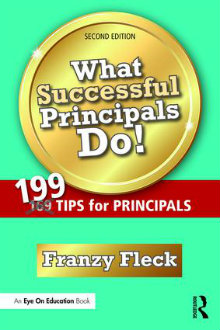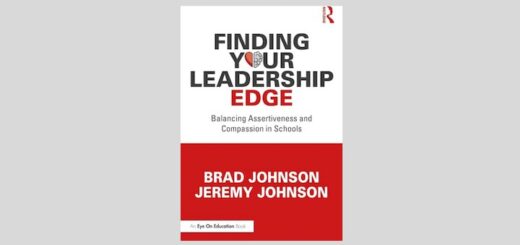199 Tips Help You Be a Successful Principal
What Successful Principals Do! 199 Tips for Principals, 2nd Edition
By Franzy Fleck
(Routledge/Eye on Education, 2017 – Learn more)

Franzy Fleck has been a teacher, dean, principal, curriculum coordinator and superintendent in Chicago, Illinois. He understands the principalship can be a lonely, difficult position, full of “gray” areas when making decisions. But this is a practical book because “hope is not a strategy” (#98) when it comes to helping people grow.

It may seem that some of the tips about basic etiquette and politeness should go without saying and are simply advice for life, and that a principal should have had to consistently exhibit a basic knowledge of people skills, writing skills and communication skills before being hired. But Fleck does go into more depth beyond good manners as the book progresses.
Growing as a leader
Part I, “Developing You,” suggests a leader doesn’t enter a position fully formed, yet is in the business of developing students and staff, too. A whole philosophy underlies these tips that shows Fleck is a dedicated educator, willing to be humble and even have others “blame it on the principal” should it be for the higher good of students.
Fleck is empathetic and knows a principal will make mistakes. He recommends documentation, using social media, and firing ineffective teachers (what about states with tenure, union contracts?). Excellent tips include “Refrigerator Rights,” “Superhero Posture,” and getting unpleasant tasks out of the way first. He believes suspensions should be based on what’s good for the entire school.
Developing future student leaders
Part II concentrates on “Developing Future Student Leaders,” and begins with excellent tips for beginning the school year and sharing expectations. He recommends training upper-graders for leadership – more specific tips on starting a Student Council would be helpful.
Regarding discipline, Fleck reminds the reader to commend students when they admit they are at fault in order to reinforce honesty and to even give lesser punishments when honesty is shown or when the student is remorseful. When calling parents, he advises praising the child to “soften the blow” or delivering empathy first.
Tip number 63, “Teach students to Apologize,” recommends role play and modeling, but I would like to see some recommendations for effective conflict resolution programs, perhaps even run by students, so that a process could be put into place and take some of the onus off the principal.
Principals would do well to make clear that school rules might differ from home rules (#68) and school rules apply once kids enter school. When a student complains to the principal, Fleck likes to ask who’s in charge of the classroom, bus, etc. and direct the student to that person.
He discusses the importance of student written statements when disciplining because oral statements can keep changing, especially once the student gets home. He has figured out many of the ways students manipulate staff, for example trying to miss class, so sometimes he has students come to the office during lunch to “work things out” (Tip 76). His question (tip #78) “Is This the First Time You Have Done This?” can get kids to be honest.
I especially like that everyone knows Fleck hates surprises: “I Don’t Want Any Surprises. (#80).” Learn how Fleck likes to have kids and parents believe they are getting a better deal than the recommended punishment (#81). Learn why the principal should give harsher consequences than the teacher (#82) and how to use your busyness to your advantage (#83).
Tip #85 won’t work if the school has done away with lockers, and I would like to see a reminder to always have another adult witness (teacher, secretary, assistant principal) during searches of lockers, backpacks, desks, or bodies.
Developing key leaders
Part III focuses on “Developing Key Leaders.” Fleck believes all staff should have education and self-improvement goals. I like tip #90 that cautions principals not to take on too much. Learn how to make employees think an idea is theirs (#94). Find out how to address an anonymous complaint about another employee (#101).
Fleck even shows how to make an employee feel you care about their well-being even when they’re misbehaving (#103). Learn about “Anonymous Praise (110).” An especially good tip is #111 (“I Would Want to Know”) when someone’s perception of themselves differs from everyone else’s.
Fleck takes a stand (#114) on how he feels about data and assessments. He even gives suggestions for getting the union on one’s side. He advises checking lesson plans (#118), but as a principal I found having a written student-oriented objective on the white board daily worked better for me.
Tip #120 is useful for homework policies. It’s staggering to think that a single negative employee can cause up to a thirty-percent drop in team performance (#127). Tip 129 addresses firing and suggests, “Run it by your legal team.” Most principals don’t have access to the legal team in my experience. Tip #132, “Give Each Employee a Budget” also seems unrealistic.
Some excellent tips include #135, “Limit Classroom Interruptions,” and #140, “Support Substitute Teachers.” Learn about “drive bys, go bys, and stop bys” (Tip #148) and the creative use of the “Cart of good and evil” (#153). Learn how to handle sensitive issues like a student who smells (#158) and what to do about class or teacher change requests, especially when the parent believes the teacher is the problem (#162).
One of the best tips is #164, about talking to a parent first, separate from the student, so the principal stays in control. Also helpful: when it’s never right to stay silent (#165) and a way to understand and remember a parent’s perspective and background (#166).
Tip #169, “Approve Memos to Parents” to protect the teacher, school, principal, and district is good advice, and Tip #170, to call home before a student gets home, is another excellent tip. Tip #172 will advise what to do when people yell, swear, or display rude behavior. This book can help keep you out of political and legal hot water.
Ways to use this book
The school should feel like a family (#100). The best use of this book would be to hand it to new administrators upon their becoming a principal to emphasize what the district stands for and the practices expected. It would be even better if the book could be a discussion guide at principal meetings with higher-ups attending.
Fleck knows the principal may be working sometimes with angry, unreasonable, and/or unethical people. This is the challenge: significant relationships where others feel important and heard are still required, and this book will help any principal make that happen.
Dr. Mary Langer Thompson’s articles, short stories, and poetry appear in various journals and anthologies. She is a retired school principal, who now writes and teaches writing workshops in schools, in prisons, and in her community.



































